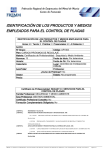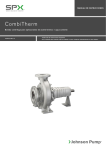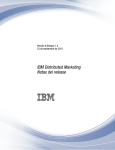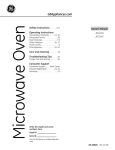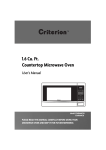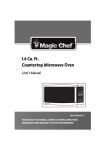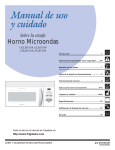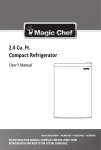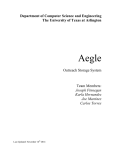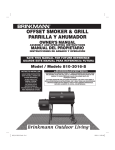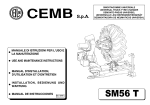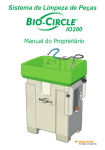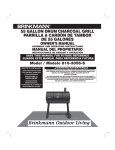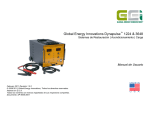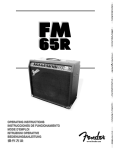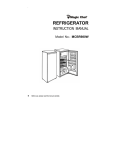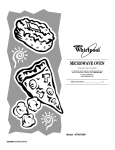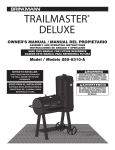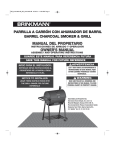Download 1.3 Cu. Ft. Countertop Microwave Oven
Transcript
1.3 Cu. Ft. Countertop Microwave Oven User's Manual Model MCM1310SB PLEASE READ THIS MANUAL CAREFULLY BEFORE USING YOUR MICROWAVE OVEN AND KEEP IT FOR FUTURE REFERENCE. Product Registration Thank you for purchasing a Magic Chef product. The first step to protect your new product is to complete the product registration on our website: www.mcappliance.com/register. The benefits of registering your product include the following: 1. Registering your product will allow us to contact you regarding a safety notification or product update. 2. Registering your product will allow for more efficient warranty service processing when warranty service is required. 3. Registering your product could act as your proof of purchase in the event of insurance loss. Once again, thank you for purchasing a Magic Chef product. PRECAUTIONS TO AVOID POSSIBLE EXPOSURE TO EXCESSIVE MICROWAVE ENERGY (a) Do not attempt to operate this oven with the door open since open-door operation can result in harmful exposure to microwave energy. It is important not to defeat or tamper with the safety interlocks. (b) Do not place any object between the oven front face and the door or allow soil or cleaner residue to accumulate on sealing surfaces. (c) Do not operate the oven if it is damaged. It is particularly important that the oven door closes properly and that there is no damage to the: (1) door (bent), (2) hinges and latches (broken or loosened), (3) door seals and sealing surfaces. (d) The oven should not be adjusted or repaired by anyone except properly qualified service personnel. EN-1 TABLE OF CONTENTS z PRECAUTIONS TO AVOID POSSIBLE EXPOSURE TO EXCESSIVE MICROWAVE ENERGY……………………….. 1 z IMPORTANT SAFETY INSTRUCTIONS…………………………………………………………………..…………….…...... 3 z FEDERAL COMMUNICATIONS COMMISSION z GROUNDING INSTRUCTIONS………………………………………………………………………………........………….... 4 z INSTALLATION………………………………………………………………………………………………………...………..… 5 z SPECIFICATIONS………………………………………………………………………………………………………………….6 z PARTS AND FEATURES……………………………………………………………………………………………...………..…7 z MICROWAVE OVEN CONTROL…………………………………………………………………………..……….….……..…. 7 RADIO FREQUENCY INTERFERENCE STATEMENT………………………………………………….….……………..… 4 TURNTABLE…………………………………………………………………………………………………………….…..….….7 DISPLAY………………………………………………………………………………………………………………….……..….7 START……………………………………………………………………………………………………………………………....8 ADD 30 SECONDS………..…………………………………………………………………………………….….……….........8 EXPRESS COOK……………………………………………………………………………………………………………...…..8 STOP/CANCEL.………………………………………………………………………………………………….………...…..….8 CLOCK….………………………………………………………………………………………………………………..……..…..8 TONES.……………………………………………………………………………………………………………………...….…..8 KITCHEN TIMER…………………………………………………………………………………………………….….……..…..8 CONTROL LOCK ……….………………………………………………………………………………………….....……….….8 z MICROWAVE OVEN USE……………………………………………………………………………………..………..…..…….9 FOOD CHARACTERISTICS………………………………………………………………………………..………….….….….9 COOKING GUIDELINES………………………………………………………………………………………………...…….….9 COOKWARE AND DINNERWARE………………………………………………………………………………..……….…….9 ALUMINUM FOIL AND METAL………………………………………………………………………….……………..….……..10 MICROWAVE COOKING POWER…………………………………………………………………………….……….…....…..10 MANUAL COOKING………………………………………………………………………………………………………..….…..11 COOKING IN STAGES……………………………………………………………………………………………….…….….….11 . DEFROST………………………………………………………………………………………………………...………….….…11 MEMORY…………………………………………………………………………………………………………………….….….12 POPCORN…………………………………………………………………………………………………………..……...….…. .12 POTATO……………………………………………………………………………………………………………….……...…….12 PIZZA……………………………………………………………………………………………………….………………...……. 13 BEVERAGE…………………………………………………………………………………………………………………..…… .13 DINNER PLATE………………………………………………………………………………………………………..…....….… 13 z FROZEN VEGETABLE …………………………………………………………………………………………….……………. 13 CARE OF YOUR MICROWAVE OVEN……………………………………………………………………….…….…….……. . 14 z BEFORE YOU CALL FOR SERVICE…………………………………………………………………………….……….……. .. 15 z CARE AND CLEANING…………………………………………………………………………………………………………. .. 15 z QUESTIONS AND ANSWERS………………………………………………………………………………….…….………… .. 16 z USE YOUR MICROWAVE OVEN SAFELY……………………………………………………………………...…………….…17 z ARCING……………………………………………………………………………………………………………………………….17 z MICROWAVE OVEN WARRANTY…………………………………………………………………………………..…….…...…18 EN-2 IMPORTANT SAFETY INSTRUCTIONS When using electrical appliances, basic safety precautions should be followed, including the following: WARNING-To reduce the risk of burns, electric shock, fire, injury to persons or exposure to excessive microwave energy: 11. Read all instructions before using the appliance. c) If materials inside the oven ignite, keep oven door closed, turn oven off, and disconnect the power cord, or shut off power at the fuse or circuit breaker panel. d) Do not use the cavity for storage purposes. Do not leave paper products, cooking utensils, or food in the cavity when not in use. 12. Read and follow the specific “PRECAUTIONS TO AVOID POSSIBLE EXPOSURE TO EXCESSIVE MICROWAVE ENERGY” found on page 1. 13. This appliance must be grounded. Connect only to properly grounded outlet. See “GROUNDING INSTRUCTIONS” found on page 4. 14. Install or locate this appliance only in accordance with the provided installation instructions. 15. Some products such as whole eggs and sealed containers - for example, closed glass jars are able to explode and should not be heated in this oven. 16. Use this appliance only for its intended use as described in this manual. Do not use corrosive chemicals or vapors in this appliance. This type of oven is specifically designed to heat, cook, or dry food. It is not designed for industrial or laboratory use. 17. As with any appliance, close supervision is necessary when used by children. 18. Do not operate this appliance if it has a damaged cord or plug, if it is not working properly, or if it has been damaged or dropped. 19. This appliance should be serviced only by qualified service personnel. Contact nearest authorized service facility for examination, repair or adjustment. 10. Do not cover or block any openings on the appliance. 11. Do not store this appliance outdoors. Do not use this product near water — for example, near a kitchen sink, in a wet basement, near a swimming pool, or similar locations. 12. Do not immerse cord or plug in water. 13. Keep cord away from heated surfaces. 14. Do not let cord hang over edge of table or counter. 15. When cleaning surfaces of door and oven that comes together on closing the door, use only mild, non-abrasive soaps or detergents applied with a sponge or soft cloth. 16. To reduce the risk of fire in the oven cavity: a) Do not overcook food. Carefully attend appliance when paper, plastic, or other combustible materials are placed inside the oven to facilitate cooking. b) Remove wire twist-ties from paper or plastic bags before placing bag in oven. 17. Liquids, such as water, coffee, or tea are able to be overheated beyond the boiling point without appearing to be boiling due to surface tension of the liquid. Visible bubbling or boiling when the container is removed from the microwave oven is not always present. THIS COULD RESULT IN VERY HOT LIQUIDS SUDDENLY BOILING OVER WHEN A SPOON OR OTHER UTENSIL IS INSERTED INTO THE LIQUID. To reduce the risk of injury to persons: a) Do not overheat the liquid. b) Stir the liquid both before and halfway through heating it. c) Do not use straight-sided containers with narrow necks. d) After heating, allow the container to stand in the microwave oven for a short time before removing the container. e) Use extreme care when inserting a spoon or other utensil into the container. 18. Do not use this microwave oven to heat corrosive chemicals (for example, sulfides and chlorides). Vapors from such corrosive chemicals may interact with the contact and springs of the safety interlock switches thereby rendering them inoperable. 19. Keep the waveguide cover clean at all times. Wipe the oven interior with a soft damp cloth after each use. If you leave grease or fat anywhere in the cavity it may overheat, smoke or even catch fire when next using the oven. 20. Never heat oil or fat for deep frying as you cannot control the temperature and doing so may lead to overheating and fire. 21. Do not operate the oven without the glass tray in place. Be sure it is properly sitting on the rotating base. SAVE THESE INSTRUCTIONS EN-3 F EDERAL CO M MU N I C AT I O N S COMMISSION RADIO FREQUENCY INTERFERENCE STATEMENT WARNING: This equipment generates and uses ISM frequency energy and if not installed and used properly, that is in strict accordance with the manufacturer's instructions, may cause inteference to radio and television reception. It has been type-tested and found to comply with limits for an ISM Equipment pursuant to part 18 of FCC Rules, which are designed to provide reasonable protection against such interference in a residential installation. However, there is no guarantee that interference will not occur in a particular installation. If this equipment does cause interference to radio or television reception, which can be determined by turning the equipment off and on, the user is encouraged to try to correct the interference by one or more of the following: • Reorient the receiving antenna of radio or television. • Relocate the microwave oven with respect to the receiver. • Move the microwave oven away from the receiver. • Plug the microwave oven into a different outlet so that microwave oven and receiver are on different branch circuits. THE MANUFACTURER is not responsible for any radio or TV interference caused by UNAUTHORIZED MODIFICATION to this microwave oven. It is the responsibility of the user to correct such interference. GROUNDING INSTRUCTIONS This appliance must be grounded. In the event of an electrical short circuit, the grounding plug reduces the risk of electric shock by providing an escape wire for electric current. This appliance is equipped with a cord having a grounding wire with a grounding plug. The plug must be plugged into an outlet that is properly installed and grounded. WARNING: Improper use of the grounding can result in a risk of electric shock. Consult a qualified electrician or serviceman if the grounding instructions are not completely understood, or if doubt exists as to whether the appliance is properly grounded, and either : If it is necessary to use an extension cord, use only a 3-wire extension cord that has a 3-blade grounding plug, and a 3-slot receptacle that will accept the plug on the appliance. The marked rating of the extension cord shall be equal to or greater than the electrical rating of the appliance. WARNING: Do not cut or remove the third (ground) prong from the power cord under any circumstances. EN-4 INSTALLATION 1. Examine the oven after unpacking. Check for damages such as a misaligned door, broken door or dent in the cavity. If any damage is visible, DO NOT INSTALL, and notify your dealer immediately. 2. Level, flat location. Install the microwave oven on a level, flat surface. 3. Ventilation. Do not block air vents. If they are blocked during operation, the oven may overheat and eventually cause a failure. For proper ventilation, allow 4 inches (10.16 cm) of space between oven top, sides, rear and adjacent surfaces. 4. Away from radio and TV sets. Poor television reception and radio interference may result if the oven is located close to a TV, radio, antenna, feeder, etc. Place the oven as far from them as possible. 5. Away from heating appliances and water taps. Keep the oven away from heat, steam or splashing liquids. These things can adversely affect oven wiring and contacts. 6. Power supply. • Check your local power source. This microwave oven requires a current of approximately 12 amperes, AC 120Volts, 60Hz grounded outlet. 1. A short power-supply cord is provided to reduce the risks resulting from becoming entangled in or tripping over a longer cord. 2. Longer cord sets or extension cords are available and may be used if care is exercised in their use. 3. If a long cord or extension cord is used: • The marked electrical rating of the cord set or extension cord should be at least as great as the electrical rating of the appliance. • The extension cord must be a grounding type 3-wire cord. • The longer cord should be arranged so that it will not drape over the counter top or tabletop where it can be pulled on by children or tripped over unintentionally. 7. The minimum height of free space necessary above the top surface of the oven is about 4 inches (10.16 cm). When using a 3-pronged plug When using a grounding adaptor, make sure the receptacle box is fully grounded. 3-prong Receptacle Grounding Lead Receptacle Box cover Receptacle Box Cover 3-prong plug Grounding Adaptor Receptacle NOTE: THE CANADIAN ELECTRICAL CODE DOES NOT ALLOW THE USE OF THE GROUNDING ADAPTOR. EN-5 SPECIFICATIONS 120V AC, 60Hz SINGLE PHASE WITH GROUNDING POWER SUPPLY INPUT POWER MICROWAVE 1450 W ENERGY OUTPUT 1000 W FREQUENCY 2,450MHz OUTSIDE DIMENSIONS (W CAVITY DIMENSIONS (W H H 519 x 314 x 430 mm (20.4 x 12.4 x 16.9 in) D) 351 x 249 x 406 mm (13.8 x 9.8 x 16.0 in) D) CAVITY VOLUME 1.3 cu.ft NET WEIGHT APPROX. 33.3 lbs. TIMER 99 min. 99 sec. POWER LEVELS 11 Levels * Specifications are subject to change without notice. 16.9 12.4 20.4 EN-6 MICROWAVE OVEN CONTROL PARTS AND FEATURES This manual may cover several different models. The model you have purchased may have some or all of the features shown here. The appearance of your particular model may differ slightly from the illustrations in this manual. A C B D E F G D. Microwave inlet cover A. Door lock system B. Metal shielded window E. Microwave oven light F. Display C. Glass turntable G. Control panel Turntable A B C A. Turntable B. Hub C. Roller Guide The turntable can rotate in either direction to help cook food more evenly. For best cooking results, do not operate the microwave oven without having the turntable in place. See “Assistance or Service” to reorder any of the parts. To Install: 1. Install the hub into the hole in the center of the microwave oven cavity bottom. 2. Place the support on the microwave oven cavity bottom. 3. Place the turntable on the support. Fit the raised, curved mounds in the center of the turntable bottom between the three spokes of the hub. Display When power is first supplied to the microwave oven, “0:00” will appear in the display. If the “0:00” appears in the display at any other time, a power failure has occurred. Reset the clock if needed. See “Clock” section. When the microwave oven is in use, the display shows cook time remaining. When the microwave oven is not in use, the display shows the time of day (if the clock is set) or Timer countdown. EN-7 Start Tones The START control (START/+30SEC pad) begins any function. If cooking is interrupted by touching STOP/CANCEL or by opening the door, touching START/+30SEC will resume the cycle. Tones are audible signals that indicate the following: One tone 1. Valid entry (short tone) 2. End of stage in multistage cooking 3. Control lock activated or deactivated (long tone) Add 30 Seconds The +30SEC control (START/+30SEC) automatically starts the microwave oven at 100% power for 30 seconds, and adds 30 seconds of cook time with each additional touch of the control. Five tones 1. End of cycle 2. End of Kitchen Timer countdown Express Cook Each of the EXPRESS COOK controls (number pads 1-6) automatically starts the microwave oven at 100% power for 1 minute, 2 minutes, 3 minutes, 4 minutes, 5 minutes or 6 minutes, depending on which pad is touched. Stop/Cancel The STOP/CANCEL control clears any incorrect command, and pauses and/or cancels any program during cooking. It will not erase the time of day. A cooking program may be paused by touching STOP/CANCEL once or by opening the door. The cycle may be resumed by touching START/+30SEC. A cooking program may be canceled by touching STOP/CANCEL twice, or by opening the door and then touching STOP/CANCEL. The STOP/CANCEL control is also used to lock and unlock the control panel. See “Control Lock” section. Kitchen Timer The Kitchen Timer can be set in minutes and seconds, up to 99 minutes, 99 seconds, and counts down the set time. The Kitchen Timer may not be used while any other function is operating. NOTE: The Kitchen Timer does not start or stop the microwave oven. To Set: 1. Touch KITCHEN TIMER control . “00:00” will appear in the display, with the first “0” flashing. 2. Enter desired time in minutes and seconds, filling all four digits from left to right. Example: 1-0-0-0 for 10 minutes, or 0-5-0-0 for 5 minutes. 3. Touch START/+30SEC. When the set time ends, end-of-timer tones will sound, and the display will return to the time of day. 4. Touch STOP/CANCEL at any time during the countdown to cancel the Kitchen Timer. Clock This is a standard 12-hour clock (1:00-12:59). If the clock is not set, “0:00” will remain in the display. When the clock is set,the “:” will flash.During cooking, the clock may be seen for 3 seconds by touching CLOCK. To Set: The microwave oven must be in standby mode (no functions operating). 1. Touch CLOCK control “00:00” will appear in the display, with the first “0” flashing. 2. Enter current time, filling all four digits from left to right. The first digit can be only “1” or “0.” 3. Touch CLOCK . Control Lock The Control Lock shuts down the control panel pads to avoid unintended use of the microwave oven. To Lock/Unlock Control: The microwave oven must be in standby mode. Touch and hold STOP/CANCEL for 3 seconds until one long tone sounds and the display clears to show an outline of the display area. Repeat to unlock control, and return the display to the time of day. If any pad is touched while the control is locked, there will be no response from the microwave oven. EN-8 MICROWAVE OVEN USE A magnetron in the microwave oven produces micro waves which reflect off the metal floor, walls and ceiling and pass through the turntable and appropriate cookware to the food. Microwaves are attracted to and absorbed by fat, sugar and water molecules in the food, causing them to move, producing friction and heat which cooks the food. 1. To avoid damage to the microwave oven, do not lean on or allow children to swing on the microwave oven door. 2. To avoid damage to the microwave oven, do not operate when it is empty. 3. Baby bottles and baby food jars should not be heated in microwave oven. 4. Clothes, flowers, fruit, herbs, wood, gourds, paper, including brown paper bags and newspaper, should not be dried in microwave oven. 5. Paraffin wax will not melt in the microwave oven because it does not absorb microwaves. 6. Use oven mitts or pot holders when removing con tainers from microwave oven. 7. Do not overcook potatoes. At the end of the reco mmended cook time, potatoes should be slightly firm. Let potatoes stand for 5 minutes. They will finish cooking while standing. 8. Do not cook or reheat whole eggs inside the shell. Steam buildup in whole eggs may cause them to burst, requiring significant cleanup of microwave oven cavity. Cover poached eggs and allow a standing time. Food Characteristics When microwave cooking, the amount, size and shape, starting temperature, composition and density of the food affect cooking results. Amount of Food The more food heated at once, the longer the cook time needed. Check for doneness and add small increments of time if necessary. Size and Shape Smaller pieces of food will cook more quickly than larger pieces, and uniformly shaped foods cook more evenly than irregularly shaped food. Starting Temperature Room temperature foods will heat faster than refrigerated foods, and refrigerated foods will heat faster than frozen foods. Composition and Density Foods high in fat and sugar will reach a higher temper ature, and will heat faster than other foods. Heavy, dense foods, such as meat and potatoes, require a longer cook time than the same size of a light, porous food, such as cake. Cooking Guidelines Covering Covering food helps retain moisture, shorten cook time and reduce spattering. Use the lid supplied with cookware. If a lid is not available, wax paper, paper towels or plastic wrap approved for microwave ovens may be used. Plastic wrap should be turned back at one corner to provide an opening to vent steam.Condensation on the door and cavity surfaces is normal during heavy cooking. Stirring and Turning Stirring and turning redistribute heat evenly to avoid over cooking the outer edges of food. Stir from outside to center. If possible, turn food over from bottom to top. Arranging If heating irregularly shaped or different sized foods, arrange the thinner parts and smaller sized items toward the center.If cooking several items of the same size and shape, place them in a ring pattern, leaving the center of the ring empty. Piercing Before heating, use a fork or small knife to pierce or prick foods that have a skin or membrane, such as potatoes, egg yolks, chicken livers, hot dogs, and sausage. Prick in several places to allow steam to vent. Shielding Use small, flat pieces of aluminum foil to shield the thin pieces of irregularly shaped foods, bones and foods such as chicken wings, leg tips and fish tail. See “Aluminum Foil and Metal” first. Standing Time Food will continue to cook by the natural conduction of heat even after the microwave cooking cycle ends. The length of standing time depends on the volume and density of the food. Cookware and Dinnerware Cookware and dinnerware must fit on the turntable. Always use oven mitts or pot holders when handling because any dish may become hot from heat transf erred from the food. Do not use cookware and dinnerware with gold or silver trim. Use the following chart as a guide, then test before using. MATERIAL RECOMMENDATIONS Aluminum Foil, See “Aluminum Foil and Metal” section. Metal Browning Dish Bottom must be at least 3/16" (5 mm) above the turntable. Follow manufacturer’s recommendations. Ceramic Glass, Acceptable for use. Glass EN-9 MATERIAL RECOMMENDATIONS China, Earthenware Follow manufacturer’s recommendations. Melamine Follow manufacturer’s recommendations. Paper:Towels, Use nonrecycled and those approved by Dinnerware, the manufacturer for microwave oven use. Napkins Plastic:Wraps, Use those approved by the manufacturer Bags, Covers, for microwave oven use. Dinnerware, Containers Pottery and Clay Silicone Bakeware PERCENT/ NAME NUMBER Follow manufacturer’s recommendations. Acceptable for use. To Test Cookware or Dinnerware for Microwave Use: 1. Place cookware or dinnerware in microwave oven with 1 cup (250 mL) of water beside it. 2. Cook at 100% cooking power for 1 minute. Do not use cookware or dinnerware if it becomes hot and the water stays cool. Aluminum Foil and Metal Always use oven mitts or pot holders when removing dishes from the microwave oven. Aluminum foil and some metal can be used in the microwave oven. If not used properly, arcing (a blue flash of light) can occur and cause damage to the microwave oven. 10 Quick heating convenience foods and foods with high water content, such as soups, beverages and most vegetables. 90% 9 Cooking small, tender pieces of meat, ground meat, poultry pieces and fish fillets. Heating cream soups. 80% 8 Heating rice, pasta or stirrable casseroles. Cooking and heating foods that need a cook power lower than high. For example, whole fish and meat loaf. 70%, Medium-High 7 Reheating a single serving of food. 60% 6 Cooking sensitive foods such as cheese and egg dishes, pudding and custards. Cooking non-stirrable casseroles, such as lasagna. 50%, Medium 5 Cooking ham, whole poultry and pot roasts. Simmering stews. 40% 4 Melting chocolate. Heating bread, rolls and pastries. 30%, MediumLow, Defrost 3 Defrosting bread, fish, meats, poultry and precooked foods. 20% 2 Softening butter, cheese, and ice cream. 10%, Low 1 Taking chill out of fruit. 0% 0 Work with fan for no power. OK for Use Racks and bakeware supplied with the microwave oven (on some models), aluminum foil for shielding, and approved meat thermometers may be used with the following guidelines: 1. To avoid damage to the microwave oven, do not allow aluminum foil or metal to touch the inside cavity walls, ceiling or floor. 2. Always use the turntable. 3. To avoid damage to the microwave oven, do not allow contact with another metal object during microwave cooking. USE 100%, High (default setting) Follow manufacturer’s recommendations. Straw, Wicker, Do not use in microwave oven. Wooden Containers Wax Paper Microwave Cooking Power Many recipes for microwave cooking specify which cooking power to use by percent, name or number. For example, 70% = 7 = Medium-High. Use the following chart as a general guide for the suggested cooking power of specific foods. Do Not Use Metal cookware and bakeware, gold, silver, pewter, nonapproved meat thermometers, skewers, twist ties, foil liners such as sandwich wrappers, staples and objects with gold or silver trim or a metallic glaze should not be used in the microwave oven. EN-10 Manual Cooking To Use: 1. Place food on the turntable and close the door. 2. Touch TIME COOK. 3. Enter length of time to cook. 4. Touch POWER. “PL10” will appear briefly in the display. If cooking with a power other than 100%, touch number keys to select the power levels from highest to lowest. See “Microwave Cooking Power” chart. 5. Touch START/+30SEC. The display will count down the set cook time. When the cycle ends, the end-of-cycle tones will sound, and the display will return to the time of day. 6. Touch STOP/CANCEL at any time during the countdown to pause or cancel cooking. Cooking in Stages The microwave oven can be set to cook at different cooking powers for various lengths of time, up to 2 stages. One of the stages may be an automatic Defrost function (see “Defrost” section), which will be the first stage. To Cook in Stages: 1. Place food on the turntable and close the door. 2. Touch TIME COOK. 3. Enter length of time to cook. 4. Touch POWER. “PL10” will appear briefly in the display. If cooking with a power other than 100%, touch number keys to select the power levels from highest to lowest. See “Microwave Cooking Power” chart. 5. Touch TIME COOK. 6. Enter length of time to cook for second stage. 7. Touch POWER. “PL10” will appear briefly in the display. If cooking with a power other than 100%, touch number keys to select the power levels from highest to lowest. 8. Touch START/+30SEC. The display will count down the set cook time for each stage, and a short tone will sound at the end of the first stage. The power level may be seen for 3 seconds by touching POWER during the cycling stage. When the cycle ends, the end-of-cycle tones will sound, and the display will return to the time of day. 9. Touch STOP/CANCEL at any time during the countdown to pause or cancel cooking. Cook time may be added in 30-second increments during the second stage by touching START/+30SEC control. To Use Defrost As First Stage:Touch Weight Defrost, "dEF1" appears in the display. Enter the number of ounces between 4 and 100 ounces (see “Defrost” section), then follow steps 5-8 above for second stage programming. Defrost The Defrost feature has two functions: dEF1, which is an automatic defrost by weight, and dEF2, which is a manual defrost by time. The default power level is 30%, and can be adjusted. 1. Unwrap foods and remove lids (for example, from fruit juice containers) before defrosting. 2. Shallow packages will defrost more quickly than deep blocks. 3. Separate food pieces as soon as possible during or at thr end of the cycle for more even defrosting. 4. Use small pieces of aluminum foil to shield parts of food such as chicken wings, leg tips and fish tails. See “Aluminum Foil and Metal” first. The Defrost feature should not be used for food that has been left outside the freezer for more than 20 minutes, or for frozen ready-made food. Use the following chart as a guide. MEAT Beef: ground, steaks, roast, stew Lamb: stew and chops Pork: chops, ribs, roasts, sausage The narrow or fatty areas of irregular shaped cuts should be shielded with foil before defrosting. Do not defrost less than 1/4 lb (113 g) or two 4 oz (113 g) patties. Place all meats in microwavesafe baking dish. Do not cover. POULTRY Chicken: whole and cut up Cornish hens Place in microwave-safe baking dish, chicken breast side up. Do not cover. Turkey: breast FISH Fillets, Steaks, Whole Shellfish Place in microwave-safe baking dish. Do not cover. To Defrost by Weight: 1. Place food, uncovered, on the turntable and close the door. 2. Touch WEIGHT DEFROST. “dEF1” will appear . 3. Enter the weight in ounces, from 4 to 100. If an invalid value is entered, the microwave oven will not start. 4. Touch START/+30SEC. The display will count down the defrost time. When the cycle ends, the end-of-cycle tones will sound, and the display will return to the time of day. 5. Touch STOP/CANCEL at any time during the countdown to pause or cancel cooking. To Defrost by Time: 1. Place food, uncovered, on the turntable and close the door. 2. Touch TIME DEFROST. “dEF2” will appear in the display. 3. Enter the desired time for defrosting. The default microwave power is power level 3. If you want to change the power level, press "POWER" once, and the LED will display "PL 3", then press the number pad of the power level you wanted. 4. Touch START/+30SEC. The display will count down the defrost time. When the cycle ends, the end-of-cycle tones will sound, and the display will return to the time of day. 5. Touch STOP/CANCEL at any time during the cou n t down to pause or cancel cooking. EN-11 Memory The Memory feature can store up to 3 unique cooking programs. The Auto Menu functions cannot be programmed as a memory function. To Set Memory : 1. Touch MEMORY control. “1” will appear in the display for the first memory program. 2. Set the program, following the instructions in “Manual Cooking” or “Cooking in Stages.” 3. Touch START/+30SEC. . A valid entry tone will sound, indicating that the program has been accepted to memory. 4. Touch START/+30SEC. again. The program will immediately start, and it will be saved to memory To Set Second and Third Memory Programs: Touch MEMORY twice or three times, then follow steps 2 and 3 above. To Use Memory: 1. Place food on the turntable and close the door. 2. Touch MEMORY repeatedly until the desired program number is displayed. 3. Touch START/+30SEC. The display will count down the program cook time. When the cycle ends, the end-of-cycle tones will sound, and the display will return to the time of day. 4. Touch STOP/CANCEL at any time during the countdown to pause or cancel cooking. POPCORN TOUCH Once 2 times 3 times Potato PAD TOUCH DISPLAY POTATO Once 2 times 3 times 1 2 3 SERVING SIZE 1, 8-oz (230 g) potato 2, 16-oz (460 g) potatoes 3, 24-oz (690 g) potatoes 1. Pierce each potato several times with a fork be fore baking. 2. Place a single potato on the turntable, off to the side (not centered). Place 2 or 3 potatoes on the turntable around the edges, at least 1" (2.5 cm) apart. 3. Let potato(es) stand for 5 minutes after baking. To Use POTATO: 1. Place potato(es) on the turntable and close the door. 2. Touch POTATO to select number of potatoes (see chart). 3. Touch START/+30SEC. Popcorn PAD To Use POPCORN: 1. Place popcorn bag on the turntable, and close the door. 2. Touch POPCORN to select size (see chart). 3. Touch START/+30SEC. The display will count down the popping time. When the cycle ends, the end-of -cycle tones will sound, and the display will return to the time of day. 4. Touch STOP/CANCEL at any time during the countdown to pause or cancel popping. DISPLAY SERVING SIZE 1.75 3.0 3.5 1.75 oz (50 g) 3.0 oz (85 g) 3.5 oz (99 g) The display will count down the cook time. When the cycle ends, the end-of-cycle tones will sound, and the display will return to the time of day. 4. Touch STOP/CANCEL at any time during the countdown NOTE: During Popcorn function, as with all microwave cooking functions, the microwave oven should be attended at all times. Listen for popping to slow to 1 pop every 1 or 2 seconds, then stop the cycle. 1. To avoid damage to the microwave oven, do not use regular paper bags or glassware. 2. Pop only one package of popc orn at a time. to pause or cancel cooking. 3. Follow manufacturer’s instructions when using a microwave popcorn popper. 4. For best cooking results, do not try to pop unpopped kern. 5. Use fresh bags of popcor n for optimal results. 6. Cooking results may vary by brand and fat content. For bag sizes not listed in this section, follow directions on the package. EN-12 Pizza Dinner Plate PAD TOUCH DISPLAY PIZZA Once 2 times 3 times 4.0 8.0 14.0 SERVING SIZE 1, 4-oz (113 g) slice 2, 8-oz (230 g) slices 3, 14-oz (400 g) slices PAD TOUCH DISPLAY DINNER PLATE Once 2 times 3 times 9.0 12.0 18.0 SERVING SIZE 9.0 oz (255 g) 12.0 oz (340 g) 18.0 oz (510 g) 1. Place pizza slice(s) on a paper towel or paper plate. 1. Place food on plate(s), cover with plastic wrap and vent. To Use PIZZA: 1. Place pizza on the turntable, and close the door. 2. Touch PIZZA to select number of slic es (see chart). 3. Touch START/+30SEC. The display will cou nt down the reheat time. When the cycle ends, the end-of- cycle tones will sound, and the display will return to the time of day. 4. Touch STOP/CANCEL at any time during th e countdown to pause or cancel heating. To Use DINNER PLATE: 1. Place dinner plate on the turntable and close the door . 2. Touch DINNER PLATE to select size (see chart). 3. Touch START/+30SEC. The display will count down the cook time. When the cycle ends, the end-of-cycle tones will sound, and the display will return to the time of day. 4. Touch STOP/CANCEL at any time during the countdown to pause or cancel heating. Beverage PAD TOUCH DISPLAY BEVERAGE Once 2 times 3 times 1 2 3 Frozen Vegetable SERVING SIZE 1, 4-oz (120 mL) cup 2, 8-oz (240 mL) cups 3, 12-oz (360 mL) cups 1. Do not cover. 2. The diameter of the cup’s opening will affect how the liquid heats. Beverages in cups with smaller openings may heat faster. To Use BEVERAGE: 1. Place cup(s) on the turntable, and close the door. 2. Touch BEVERAGE to select amount (see chart). 3. Touch START/+30SEC. The display will count down the heat time. When the cycle ends, the end-of-cycle tones will sound, and the display will return to the time of day. 4. Touch STOP/CANCEL at any time during the countdown to pause or cancel heating. PAD TOUCH FROZEN Once VEGETABLE 2 times 3 times DISPLAY 4.0 8.0 16.0 SERVING SIZE 4.0 oz (113 g) 8.0 oz (230 g) 16.0 oz (460g) 1. Remove frozen vegetables from package. 2. Place in microwave-safe container. 3. Add water: 2 tbs (30mL) to 4.0 oz (113 g) vegetables; 4 tbs (60 mL) to 8.0 oz (230 g) vegetables; 1/3 cup (80 mL) to 16.0 oz(460 g) vegetables. 4. Cover with plastic wrap and vent. 5. Stir and let stand 2-3 minutes after cooking. To Use FROZEN VEGETABLE: 1. Place food on the turntable and close the door. 2. Touch FROZEN VEGETABLE to select amount (see chart). 3. Touch START/+30SEC. The display will count down the cook time. Whenthe cycle ends, the end-of-cycle tones will sound, . and the display will return to the time of day 4. Touch STOP/CANCEL at any time during the countdown to pause or cancel cooking. EN-13 CARE OF YOUR MICROWAVE OVEN The oven should be cleaned regularly and any food deposits removed. Failure to maintain the oven in a clean condition could lead to deterioration of the surface that could adversely affect the life of the appliance and possibly result in a hazardous situation. 1 Unplug the power cord before cleaning any part of this oven. 2 Keep the inside of the oven clean. When food spatters or spilled liquids adhere to oven walls, wipe with a damp cloth. Mild detergent may be used if the oven gets very dirty. The use of harsh detergent or abrasives is not recommended. no way indicates malfunction of the unit. 3 The outside oven surface should be cleaned with soap and water, rinsed and dried with a soft cloth. To prevent damage to the operating parts inside the oven, water should not be allowed to seep into the ventilation openings. 4 If the Control Panel becomes wet, clean with a soft, dry cloth. Do not use harsh detergents or abrasives on Control Panel. 5 If steam accumulates inside or around the outside of the oven door, wipe with a soft cloth. This may occur when the microwave oven is operated under high humidity conditions and in 6 It is occasionally necessary to remove the glass tray for cleaning. Wash the tray in warm sudsy water or in a dishwasher. 7 The roller guide and oven cavity floor should be cleaned regularly to avoid excessive noise. Simply wipe the bottom surface of the oven with mild detergent water or window cleaner and dry. ROLLER GUIDE 1 The ROLLER GUIDE and oven floor should be cleaned frequently to prevent excessive noise. 2 The ROLLER GUIDE MUST ALWAYS be used for cooking together with the Glass Tray. GLASS TRAY 1 DO NOT operate the oven without the Glass Tray in place. 2 3 DO NOT use any other Glass Tray with this oven. 4 DO NOT cook directly on the Glass Tray. If Glass Tray is hot, ALLOW TO COOL before cleaning or placing it in water. EN-14 Glass Tray Roller Guide BEFORE YOU CALL FOR SERVICE Refer to following checklist, you may prevent an unnecessary service call. * The oven doesn’t work; 1. Check that the power cord is securely plugged in. 2. Check that the door is firmly closed. 3. Check that the cooking time is set. 4. Check for a blown circuit fuse or tripped main circuit breaker in your house. * Sparking in the cavity; 1. Check utensils. Metal containers or dishes with metal trim should not be used. 2. Check that metal skewers or foil does not touch the interior walls. If there is still a problem, contact the service station. A list of these stations is included in the oven. CARE AND CLEANING Although your oven is provided with safety features, it is important to observe the following: 1. It is important not to defeat or tamper with safety interlocks. 2. Do not place any object between the oven front face and the door or allow residue to accumulate on sealing surfaces. Wipe the sealing area frequently with a mild detergent, rinse and dry. Never use abrasive powders or pads. 3. When opened, the door must not be subjected to strain, for example, a child hanging on an opened door or any load could cause the oven to fall forward to cause injury and also damage to the door. Do not operate the oven if it is damaged, until it has been repaired by a competent service technician. It is particularly important that the oven closes properly and that there is no damage to the: i) Door(bent) ii) Hinges and Hooks(loose or broken) iii) Door seals and sealing surfaces. 4. The oven should not be adjusted or repaired by anyone except a properly competent service technician. 5. The oven should be cleaned regularly and any food deposits removed. 6. Failure to maintain the oven in a clean condition could lead to deterioration of the surface that could adversely affect the life of the appliance and possibly result in a hazardous situation. EN-15 QUESTIONS AND ANSWERS * Q : Can the oven be used with the glass tray or roller guide removed? * A : No. Both the glass tray and roller guide must always be used in the oven before cooking. * Q : Can I open the door when the oven is operating? * A : The door can be opened anytime during the cooking operation. The microwave energy will be instantly switched off and the time setting will maintain until the door is closed. * Q : Why do I have moisture in my microwave oven after cooking? * A : The moisture on the side of your microwave oven is normal. It is caused by steam from cooking food hitting the cool oven surface. * Q : Does microwave energy pass through the viewing screen in the door? * A : No. The metal screen bounces back the energy to the oven cavity. The holes are made to allow light to pass through. They do not let microwave energy pass through. * Q : Why do eggs sometimes pop? * A : When baking or poaching eggs, the yolk may pop due to steam build-up inside the yolk membrane. To prevent this, simply pierce the yolk with a toothpick before cooking. Never cook eggs without piercing their shells. * Q : What does “standing time” mean? * A : “Standing time” means that food should be removed from the oven and covered for additional time to allow it to finish cooking. This frees the oven for other cooking. * Q : Why does my oven not always cook as fast as the microwave cooking guide says? * A : Check your cooking guide again, to make sure you’ve followed directions exactly; and to see what might cause variations in cooking time. Cooking guide times and heat settings are suggestions, to help prevent over-cooking... the most common problem in getting used to a microwave oven. Variations in the size, shape and weights and dimensions could require longer cooking time. Use your own judgement along with the cooking guide suggestions to check whether the food has been properly cooked just as you would do with a conventional cooker. * Q : Will the microwave oven be damaged if it operates while empty? * A : Yes. Never run it empty. * Q : Can I operate my microwave oven without the turntable or turn the turntable over to hold a large dish? * A : No. If you remove or turn over the turntable, you will get poor cooking results. Dishes used in your oven must fit on the turntable. * Q : Why is standing time recommended after the cooking operation has been completed? * A : Standing time is very important. With microwave cooking, the heat is in the food, not in the oven. Many foods build up enough internal heat to allow the cooking process to continue, even after the food is removed from the oven. Standing time for joints of meat, large vegetables and cakes is to allow the inside to cook completely, without overcooking the outside. * Q : Is it normal for the turntable to turn in either direction? * A : Yes. The turntable rotates clockwise or counterclockwise, depending on the rotation of the motor when the cooking cycle begins. * Q : Can I pop popcorn in my microwave oven? How do I get the best results? * A : Yes. Pop packaged microwave popcorn following manufacture’s guidelines. Do not use regular paper bags. Use the “listening test” by stopping the oven as soon as the popping slows to a “pop” every 1 or 2 seconds. Do not repop unpopped kernels. Do not pop popcorn in glass cookware. EN-16 USE YOUR MICROWAVE OVEN SAFELY General Use Do not attempt to defeat or tamper with safety interlocks. Do not place any object between the oven front frame and the door or allow residue to build up on sealing surfaces. Wipe with a mild detergent, rinse and dry. Never use abrasive powders or pads. Do not subject the oven door to strain or weight such as a child hanging on an open door. This could cause the oven to fall forward resulting in injury to you and damage to the oven. Do not operate the oven if door seals or sealing surfaces are damaged; or if door is bent; or if hinges are loose or broken. Do not operate the oven empty. This will damage the oven. Do not attempt to dry clothes, newspapers or other materials in the oven. They may catch on fire. Do not use recycled paper products as they may contain impurities which may cause sparks or fires. Do not hit or strike the control panel with hard objects. This can damage the oven. Food Never use your microwave oven for home canning. The oven is not designed for proper home canning. Improperly canned food may spoil and be dangerous to consume. Always use the minimum recipe cooking time. It is better to undercook rather than overcook foods. Undercooked foods can be returned to the oven for more cooking. If food is overcooked, nothing can be done. Heat small quantities of food or foods with low moisture carefully. These can quickly dry out, burn or catch on fire. Do not heat eggs in the shell. Pressure may build up and eggs can explode. Potatoes, apples, egg yolks and sausages are examples of food with non-porous skins. These must be pierced before cooking to prevent bursting. Do not attempt to deep fat fry in your microwave oven. Always allow a standing time of at least 20 seconds after the oven has been switched off to allow the temperature to even out, stir during heating, if necessary, and ALWAYS stir after heating. To prevent eruptive boiling and possible scalding, you should put a spoon or glass stick into the beverages and stir before, during and after heating. Do not leave the oven unattended while popping corn. Do not pop corn in a paper bag unless it is the commercially prepared Microwave Popcorn product. The kernels can overheat and ignite a brown paper bag. Do not put packaged Microwave Popcorn bags directly on the oven tray. Place the package on a microwave safe glass or ceramic plate to avoid overheating and cracking the oven tray. Do not exceed the Microwave Popcorn manufacturers suggested popping time. Longer popping does not yield more popcorn but it can result in buring the popcorn or risk of fire. Remember, the Popcorn bag and tray can be too hot to handle. Remove with caution and use pot holders. ARCING If you see arcing, touch the STOP/CLEAR pad and correct the problem. Arcing is the microwave term for sparks in the oven. Arcing is caused by: • Metal or foil touching the side of the oven. • Foil not molded to food (upturned edges act like antennas). • Metal, such as twist-ties, poultry pins, or gold rimmed dishes, in the microwave. • Recycled paper towels containing small metal pieces being used in the microwave. EN-17 Limited Warranty MC Appliance Corporation warrants each new Counvertop Microwave Oven to be free from defects in material and workmanship, and agrees to remedy any such defect or to furnish a new part(s), at the company’s option, for any part(s) of the unit that have failed during the warranty period. Parts and labor expenses are covered on this unit for a period of one year from the date of purchase. A copy of the dated sales receipt or invoice is required to receive warranty service by an authorized service agent. In addition, MC Appliance Corporation warrants the magnetron (parts only) to be free from defects in material and workmanship for a period of eight years. The consumer is responsible for all labor and transportation expenses related to the diagnosis and replacement of the magnetron after the initial one-year warranty expires. In the event the unit requires replacement or refund under the terms of this warranty, the consumer is responsible for all transportation expenses to return the unit to our factory prior to receiving a replacement unit or refund. A copy of the dated sales receipt/invoice is required to receive warranty service, replacement or refund. This warranty covers appliances in use within the contiguous United States, Alaska, Hawaii and Puerto Rico. This warranty does not cover the following: • Damages due to shipping damage or improper installation. • • Damages due to misuse or abuse. Content losses due to failure of the unit. • Repairs performed by unauthorized service agents. • Service calls that do not involve defects in material and workmanship such as instructions on proper use of the product or improper installation. • • Replacement or resetting of house fuses or circuit breakers. Failure of this product if used for other purposes than its intended purpose. • Disposal costs for any failed unit not returned to our factory. • • Any delivery/installation costs incurred as the result of a unit that fails to perform as specified. Expenses for travel and transportation for product service if your appliance is located in a remote area where service by an authorized service technician is not available. The removal and reinstallation of your appliance if it is installed in an inaccessible location or is not installed in accordance with published installation instructions. • • Refunds for non repairable products are limited to the price paid for the unit per the sales receipt. Limitations of Remedies and Exclusions: Product repair in accordance with the terms herein, is your sole and exclusive remedy under this limited warranty. Any and all implied warranties including merchantability and fitness for a particular purpose are hereby limited to one year or the shortest period allowed by law. MC Appliance Corporation is not liable for incidental or consequential damages and no representative or person is authorized to assume for us any other liability in connection with the sale of this product. Under no circumstances is the consumer permitted to return this unit to the factory without the prior written consent of MC Appliance Corporation. Some states prohibit the exclusion or limitation of incidental or consequential damages, or limitations on implied warranties. This warranty gives you specific legal rights, and you may also have other rights which vary from state to state. Model Parts & Labor Magnetron (Parts Only) Type of Service MCM1310SB One Year Eight Years Carry In For Service or Assistance please call 888-775-0202 or visit us on the web at www.mcappliance.com to request warranty service or order parts. EN-18 CNA International, Inc. d/b/a MC Appliance Corporation. All rights reserved. Magic Chef® logo is a registered trademark of CNA International, Inc. www.mcappliance.com Printed in China N 1.3 Cu. Ft. Microondas de encimera Manual del usuario Modelo MCM1310SB LEA ESTE MANUAL ANTES DE UTILIZAR SU MICROONDAS Y GUÁRDELO PARA FUTURA REFERENCIA. Registración del producto Gracias por comprar el producto Magic Chef. El primer paso para proteger su nuevo producto es completar la forma de registración en nuestra pagina web: www.mcappliance/register. Los beneficios de registrar su producto incluyen lo siguiente: 1. Al registrar su producto nos permite contactarle para notificarle de un cambio de seguridad o actualización del producto. 2. Si llegara a necesitar servicio bajo garantía, registrando su producto nos permite ser más eficiente en procesar el servicio. 3. En el evento que usted tenga una perdida que esta cubierto por un seguro, registrando su producto puede servir como prueba de su compra. Una vez más gracias por comprar un producto marca Magic Chef. PRECAUCIONES QUE DEBEN TENERSE PARA EVITAR QUEDAR EXPUESTO A LA ENERGIA DIRECTA DE LAS MICROONDAS (a) No intente operar el horno con la puerta abierta, ya que la operación en tal condición puede causarle un daño muy grave debido a la exposición directa con la energía de microondas. Es importante no obstruir los orificios de sujeción de los ganchos de seguridad de la puerta. (b) No coloque ningún objeto entre la puerta y el gabinete, tampoco permita la acumulación de grasa e impurezas en los orificios de sujeción de los seguros de la puerta. (c) No opere el horno en caso de estar dañado. Es de suma importancia que la puerta del horno cierre adecuadamente y que no esté floja, asimismo que las bisagras y los ganchos del seguro de la puerta no estén rotos, retorcidos o flojos. Si así fuese, acuda al centro de servicio autorizado. (d) El horno deberá repararse únicamente por le personal técnico capacitado. SP-1 SP-2 INSTRUCCIONES IMPORTANTES DE SEGURIDAD Cuando se usan equipos eléctricos deben seguirse ciertas reglas básicas de seguridad, incluyendo lo siguiente: ADVERTENCIA - Para reducir el riesgo de quemaduras, electrocución, incendio, daños a personas o exposición excesiva a la energía de microondas: b) Quite las ataduras de alambre de las bolsas de plástico o papel antes de introducirlas en el horno. c) Si las materias dentro del horno encienden, mantengan puerta de horno cerró, apaga horno, y desconecta la cuerda del poder, o apagó el poder en el fufse o entrepaño de cachón de circuito. d) No utilice el horno para almacenar, no deje productos de papel, utensilios de cocina o comida en el interior del horno cuando éste se encuentre sin operar. 11. Lea todas las Instrucciones antes de usar el equipo. 12. Lea y siga las recomendaciones en: “PRECAUCIONES QUE DEBEN TENERSE PARA EVITAR QUEDAR EXPUESTO A LA EXCESIVA ENERGIA DE MICROONDAS” señalado en la pág. 1. 13. Este equipo debe tener una conexión de tierra, lea las "INSTRUCCIONES DE CONEXION A TIERRA", encontradas en la pág. 4. 14. Instale o coloque este aparato de acuerdo únicamente con las instrucciones de instalación proporcionadas. 15. Algunos productos los huevos tal como enteros y selló contenedores-Por ejemplo, cerró vidrio los frascos son capaz de estallar y no debe ser calentado en este horno. 16. Utilice este equipo sólo para el propósito por el cual fue diseñado, especificado en este manual. No use químicos corrosivos en este equipo. Este tipo de horno ha sido diseñado exclusivamente para calentar, cocinar o descongelar alimentos. No esta diseñado para uso industrial o de laboratorio. 17. Como con cualquier aplicación, la supervisión cercana es necesaria cuando es utilizada por los niños. 18. No use el horno si tiene dañado el cable de alimentación o clavija, si funciona de manera inapropiada o si ha sufrido alguna caída. 19. Este equipo debe ser revisado solamente por un personal cualificado de servicio. Contacta un facilidad de servicio el más cercano para examinar, reparar o ajustar. 10. No cubra o bloquee ninguna salida de ventilación del equipo. 11. No almacene este aparato fuera. No utilice este producto cerca de agua- Por ejemplo, cerca de un lavaplatos, en un sótano mojado, o cerca de un estanque, o las ubicaciones semejantes. 12. No sumeria en agua el cable de alimentación o clavija. 13. Mantenga el cable de alimentación alejado de superficies calientes. 17. Los líquidos, tal como agua, el café, o el té son capaces de ser recalentado bevond el punto hirviente sin aparecer para estar heiviéndose debido surgir la tensión del líquido. Burbujear o hervir visibles cuando el contenedor se quita del horno de la microhonda no es siempre el presente. ESTO PODRIA TENER COMO RESULTADO LIQUIDOS MUY CALIENTES REPENTINAMENTE HERVIR SOBRE CUANDO UNA CUCHARA U OTRO UTIL se METEN EN EL LIQUIDO. Para reducir el riesgo de inlury a personas: a) No recaliente el líquido. b) Bata el líquido antes de y medio por la calefacciónlo. c) No utilice directamente contenedores de lados con cuellos estrechos. d) El horno de la microhonda por un tiempo corto antes de quitar el contenedor. e) Utilice el cuidado extremo cuando meter una cuchara u otro útil en el contenedor. 18. No use esta microondas para calentar químicos corrosivos (por ejemplo sulfatos o cloratos.) Los vapores de tales corrosivos pueden reaccionar con los contactos y los muelles del interruptor de seguridad resultado inutilizar. 19. Mantenga limpia la cubierta de la salida de microondas. Limpie el interior del horno con un trapo suave después de usarlo. Si usted deja grasa en cualquier parte de el interior del horno, ésta podría sobrecalentarse, humeando o atrapar fuego cuando el horno sea utilizado nuevamente. 14. No deje el cable de alimentación colgado sobre el borde de la mesa o mostrador. 20. Nunca caliente aceite o grasa para freír en el horno ya que usted no puede hacerlo y estar controlando la temperatura, estas pueden sobrecalentarse y provocar fuego. 15. Cuando se limpien las superficies que entran en contacto al cerrar la puerta, use jabones o detergentes suaves aplicados con esponja o paño suave. 21. No funcione el horno sin la bandeja de cristal en lugar. Sea seguro que se está sentando correctamente en la base que rota. 16. Para reducir el riesgo de fuego dentro del horno: a) no recuece alimento. Asista detenidamente aparato cuando papel, el plástico, u otras materias combustibles se colocan dentro del horno para facilitar la cocina. CONSERVE ESTE MANUAL DE INSTRUCCIONES SP-3 DECLARACION SOBRE INTERFERENCIA DE RADIOFRECUENCIAS DE LA COMISION FEDERAL DE COMUNICACIONES ADVERTENCIA: Este equipo genera y utiliza energía de frecuencia ISM, por lo que si no es instalado y utilizado apropiadamente, conforme a las instrucciones del fabricante, podría causar interferencia en la recepción de la radio y television. Este producto ha sido clasificado y probado; encontrándose que satisface los términos para un equipo ISM, según la sección 18 del reglamento FCC, que está planteada para ofrecer protección apropiada contra aquella interferencia en instalaciones residenciales. No obstante, no se garantiza que la interferencia no llegue a ocurrir en alguna instalación en particular. Si este equipo ocasiona interferencia en la recepción de radio o televisión, la cual puede suceder al momento de encender o apagar el equipo, entonces será preciso que el usuario intente corregir dicha interferencia mediante alguna de las siguientes indicaciones: • Reoriente la antena de recepción de radio o televisión. • Reubique el horno de microondas con respecto al receptor. • Aleje el horno de microondas del equipo receptor. • Conecte el horno de microondas en una toma de corriente diferente, de forma que el horno de microondas y el receptor se alimenten de distintos circuitos eléctricos. EL FABRICANTE no es responsable por cualquier interferencia de radio o TV causada por una MODIFICACION NO AUTORIZADA al horno de microondas. Es responsabilidad del usuario corregir dicha interferencia. INSTRUCCIONES DE CONEXION A TIERRA Este equipo debe de estar conectado a tierra; ya que en caso de un corto circuito, el cable a tierra reduce el riesgo de sufrir una descarga eléctrica al proporcionar una trayectoria de escape a la corriente eléctrica. Por lo tanto este aparato está equipado con una clavija polarizada que contiene una terminal para la conexión a tierra, la cual debe de conectarse a un contacto que esté propiamente instalado y conectado a tierra. ADVERTENCIA: La conexión inapropiada a tierra puede ser un factor de riesgo de sufrir una descarga eléctrica. Consulte a un electricista calificado o al personal de servicio, si las instrucciones de instalación no son completamente entendibles o si existe alguna duda de que el equipo esté conectado adecuadamente a tierra, cuide también: Si es necesario utilizar una extensión de corriente, entonces use únicamente extensiones de tres cables, con clavija polarizada con contacto a tierra, y que a su vez el contacto de la extension se ajuste a la clavija del equipo. La capacidad electrica de la extensión debe de ser cuando menos de la misma que la del cable del horno. Así ADVERTENCIA: No corte ni quite el tercero (ground)prong del cable eléctrico bajo cualquieres circunstancias. SP-4 INSTALACION 1. Examine el horno después de abrirlo. Revise que no esté dañado, no tenga abolladuras, que la puerta esté alineada y que la cavidad no esté rayada o abollada. Si existe algún desperfecto visible, NO INSTALE EL HORNO y notifíquelo inmediatamente a su vendedor. 2. Superficie regular y estable. Coloque el microondas sobre una superficie plana y estable. 3. Ventilación. No obstruya las rejillas de ventilación. Si estas son bloqueadas durante la operación, el horno se puede calentar excesivamente y eventualmente tener alguna falla. Para proporcionarle la adecuada ventilación, mantenga como mínimo 4 inches (10.16 cm) de espacio entre cualquier costado del horno y el lugar en donde va a instalarse. 4. Manténgalo alejado de equipos de radio y televisión. Una mala recepción de televisión e interferencia en la radio pueden presentarse si el horno está colocado cerca de la TV, radio, antena, etc., Mantenga alejado el horno de microondas de estos equipos lo más que se pueda. 5. Manténgalo alejado de equipos generadores de calor y de llaves de agua. No coloque el equipo en lugares calurosos y húmedos, para prevenir el riesgo de incendio o de sufrir una descarga eléctrica. Asimismo no lo instale cerca de la tarja. 6. Suministro de Energía - Revise el voltaje de su domicilio. Compruebe su fuente de energía local. Este horno de microondas requiere una corriente aproximada de 12 amperes, a AC 120 Voltios, 60 Hz y con contacto polarizado con conexión a tierra. 1) Este horno tiene suministrado un cable de corriente corto; esto es con la intención de prevenir el riesgo de llegar a enredarse o tropezar con él. 2) Se puede llegar a utilizar juegos de cable más largos o extensiones de corriente, siempre y cuando se tenga el debido cuidado en su uso. 3) Si se utiliza un cable largo o una extensión. Entonces el rango eléctrico del cable (calibre) o de la extensión debe de ser por lo menos del mismo tipo que el usado en el horno. El cable de extensión debe de ser del tipo de 3 conductores. El cable largo debe de acomodarse de forma que no se pueda producir un accidente, debido al tropezar o enredarse con él y a su vez de no quedar al alcance de los niños. 7. El espacio mínimo necesario que debe haber sobre la parte superior del horno es de 4 inches (10.16 cm). Cuando use clavija de 3 puntas Cuando utilice un adaptador de clavija, asegúrese de que el contacto esté debidamente conectado a tierra. Contacto para clavija de 3 puntas Cable de tierra Cubierta del contacto Clavija de 3 puntas Adaptador de clavija Cubierta del contacto Contacto NOTE: EL REGLAMENTO ELECTRICO CANADIENSE NO PERMITE EL USO DE ADAPTADORES DE TIERRA. SP-5 ESPECIFICACIONES 120V AC, 60Hz Fuente de Alimentación MONOPHASE AVEC FONDRE 1450 W Consumo MICROONDAS Potencia de salida de microondas 1000 W Frecuencia de microondas 2450 MHz Dimensiones externas (Ancho x Alto x Fondo) 519 x 314 x 430 mm (20.4 x 12.4 x 16.9 pulgadas) Dimensiones de la cavidad (Ancho x Alto x Fondo) 351 x 249 x 406 mm (13.8 x 9.8 x 16.0 pulgadas) Volumen de la cavidad 1.3 cu.ft. Peso neto Aproximadamente 33.3 lbs. Cronómetro 99 min. 99 seg. Niveles de potencia 11 niveles * Las especificaciones están sujetas a cambio sin notificación previa, por mejoras del equipo. 16. 9 12.4 20.4 SP-6 PARTES Y CARACTERÍSTICAS Este manual corresponde a varios modelos diferentes. El modelo que usted adquirió puede presentar sólo algunas de las características que aparecen aquí o todas ellas. El aspecto del modelo que usted adquirió puede ser algo diferente de las ilustraciones que aparecen en el manual. A C B D E F 3. Coloque el plato giratorio en el soporte. Coloque las partes elevadas y curvas en el centro de la base del plato giratorio entre los tres rayos del eje. CONTROL DE HORNO DE MICROONDAS G A. Traba de seguridad de la puerta B. Malla metálica de protección para la puerta C. Plato giratorio de vidrio D. Tapa de la ranura de ingreso a la cavidad E. Luz del horno F. Visor G. Panel de control Plato giratorio A B C A. Plato giratorio B. Eje C. Soporte Visor El plato giratorio puede rotar en ambas dirección para obtener una cocción más pareja. Para obtener mejores resultados, no ponga en funcionamiento el horno sin el plato giratorio colocado en su lugar. Consulte la sección “Ayuda o Servicio” para realizar el pedido de alguna parte. Para instalar: 1. Coloque el eje en el orificio que se encuentra en el centro de la base de la cavidad del horno. 2. Coloque el soporte en la base de la cavidad del horno. Cuando el horno se conecte por primera vez a la corriente eléctrica, la leyenda “0:00” aparecerá en el visor. Si en algún otro momento aparece la leyenda “0:00” en el visor, significa que hubo un corte de corriente. Vuelva a programar el reloj si es necesario. Consulte la sección “Reloj”. Cuando el horno está en uso, el visor muestra el tiempo de cocción restante. Cuando el horno no está en uso, en el visor aparece la hora del día (si se ha programado el reloj para mostrar la hora) o el tiempo restante fijado en el temporizador. SP-7 START START/+30SEC STOP/CANCEL START/+30SEC CLOCK START/+30SEC CLOCK CLOCK EXPRESS COOK STOP/CANCEL STOP/CANCEL START/+30SEC. STOP/CANCEL STOP/CANCEL STOP/CANCEL SP-8 KITCHEN TIMER START/+30SEC. STOP/CANCEL STOP/CANCEL SP-9 SP-10 PORCENTAGE NUMERO /NOMBRE SP-11 USO PORCENTAGE NUMERO /NOMBRE USO TIME COOK. Presione POWER una vez, el LED mostrará "PL10". La potencia por defecto es 100% de potencia. Ahora puede pulsar las teclas numéricas para ajustar el nivel de potencia. TIME COOK. 0% Presione POWER una vez, el LED mostrará "PL10". La potencia por defecto es 100% de potencia. Ahora puede pulsar las teclas numéricas para ajustar el nivel de potencia. 0 START/+30SEC. TIME COOK. POWER Presione POWER una vez, el LED mostrará "PL10". La potencia por defecto es 100% de potencia. Ahora puede pulsar las teclas numéricas para ajustar el nivel de potencia. STOP/CANCEL START/+30SEC. START/+30SEC. STOP/CANCEL Weight 5-8 SP-12 WEIGHT DEFROST. START/+30SEC. STOP/CANCEL TIME DEFROST START/+30SEC. STOP/CANCEL MEMORY. SP-13 START/+30SEC. START/+30SEC. MEMORY POPCORN START/+30SEC. POPCORN. MEMORY STOP/CANCEL START/+30SEC. STOP/CANCEL SP-14 BEVERAGE START/+30SEC. POTATO START/+30SEC. STOP/CANCEL STOP/CANCEL DINNER PLATE START/+30SEC. PIZZA START/+30SEC. STOP/CANCEL STOP/CANCEL SP-15 Vegetales Congelados FROZEN VEGETABLE START/+30SEC. STOP/CANCEL SP-16 MANTENIMIENTO Y CUIDADO DE SU HORNO El horno se debe limpiar regularmente y cualquier depsito del alimento quitado. La falta de mantener el horno en condiciones limpias podra conducir a la deterioracin de la superficie que podra afectar al contrario la vida de la aplicacin y dar lugar posiblemente a una situacin peligrosa. 1 2 Desconecte el horno antes de limpiarlo. 3 La parte exterior del horno debe limpiarse con agua y jabón, y enjuagarse y secarse con un paño suave. Para evitar daños a las partes que operan dentro del horno, no permita que entre agua por la abertura de ventilación. 4 Si el panel de control se moja, límpielo con un paño suave. No use detergentes o abrasivos fuertes en el panel de control. 5 Si se acumula vapor en el interior del horno o el borde de la puerta, límpielo con un paño suave. Esto suele ocurrir cuando el horno de microondas está siendo operado bajo condiciones de alta humedad, sin embargo, esto no es un indicio de mal funcionamiento. 6 Ocasionalmente es necesario retirar el plato de cristal para limpiarlo. Lávelo en agua tibia con jabón o en lavaplatos automático. 7 El arillo y la base de la cavidad, deben limpiarse regularmente para evitar que hagan demasiado ruido. Simplemente limpie la superficie con agua y detergente suave o con limpiador de ventanas y seque. El eje puede lavarse con agua tibia. Mantenga limpio el interior del horno. Cuando los alimentos salpiquen las paredes o se derramen en el interior, limpie el interior con un paño húmedo. Pude usar un detergente suave si el horno se encuentra demasiado sucio. No es recomendable usar detergentes fuertes o abrasivos. ARILLO GIRATORIO 1 El ARILLO y la base de la cavidad, deben limpiarse regularmente para evitar que hagan demasiado ruido. 2 El Plato de Cristal siempre debe colocarse sobre el ARILLO para cocinar. PLATO DE CRISTAL 1 2 No opere el horno sin el Palto de Cristal. 3 Si el plato de cristal está caliente, permita que se enfríe antes de limpiarlo o colocarlo en agua. 4 No cocine directamente sobre el Plato de Cristal. No use ningún otro plato de cristal en este horno. SP-17 Plato de Cristal Arillo Giratorio ANTES DE LLAMAR AL SER TECNICO Revisando la siguiente lista, usted podría evitar una llamada innecesaria al servicio técnico. * El horno no funciona: 1. Revise que el cable de alimentación eléctrica esté bien conectado. 2. Revise que la puerta esté firmemente cerrada. 3. Revise que el tiempo de cocción esté seleccionado. 4. Revise si los fusibles de su casa se encuentran en perfecto estado o si hay algún corto circuito. * Chispas en el interior: 1. Revise que los utensilios empleados no sean de metal o no tengan algún borde metálico. 2. Revise que las brochetas metálicas o el papel aluminio no estén rozando en las paredes internas del horno. Si persiste el problema llame al centro de servicio más cercano a su domicilio. La lista de centros de servicio se encuentra en el certificado de garantía que viene en el interior del horno. CUIDADO Y LIMPIEZA Aunque su horno se proporciona las características de seguridad, es importante observar el siguiente: 1. Es importante no derrotar o no tratar de forzar con los dispositivos de seguridad. 2. No ponga ningún objeto entre el frontface del horno y la puerta ni permita que el residuo acumule en superficies de lacre. Limpie el área de lacre con frecuencia con un detergente suave, aclaración y seqúese. Nunca utilice los polvos abrasivos o los cojines. 3. Cuando está abierta, la puerta no se debe sujetar a la tensión, por ejemplo, un niño que colgaba en una puerta abierta o cualquier carga podría hacer el horno caer adelante para causar lesión y también para dañar a la puerta. No funcione el horno si se daña, hasta que ha sido reparado por un técnico competente del servicio. Es particularmente importante que el horno se cierra correctamente y que no hay daños a: i) Door(bent) ii) Bisagras y Hookes(broken o aflojado) iii) Sellos de puerta y superficies de lacre. 4. El horno no se debe ajustar o reparar por cualquier persona excepto un técnico correctamente competente del servicio. 5. El horno se debe limpiar regularmente y cualquier depósito del alimento quitado; 6. La falta de mantener el horno en condiciones limpias podría conducir a la deterioración de la superficie que podría afectar al contrario la vida de la aplicación y dar lugar posiblemente a una situación peligrosa. SP-18 PREGUNTAS Y RESPUESTAS *P : ¿Puedo operar el horno sin el plato de cristal o sin la guía giratoria? *R : No. Ambos utensilios deben utilizarse en el horno antes de cocinar algún alimento. *P : ¿Puedo abrir la puerta cuando el horno está operando? *R : Sí. La puerta puede abrirse en cualquier momento durante la operación. Entonces la energía de la microonda será apagada inmediatamente y el ajuste del tiempo mantendrá hasta que la puerta es cerrada. *P : ¿Porqué se acumula vapor en el horno de microondas después de cocinar? *R : La acumulación de humedad es normal que ocurra. Esto sucede, porque la comida produce vapor al cocinarse, y aunque gran parte de este vapor se elimina por el aire que es ventilado, algo de vapor suele permanecer, concentrándose en las superficies frías como lo es la puerta del horno. *P : El horno de microondas causa interferencia en mi TV. ¿Es normal esto? *R : Sí. Algunas interferencias de radio o televisión pueden ocurrir mientras el horno está en funcionamiento. Esta interferencia es similar a la causada por equipos pequeños como batidoras, aspiradoras, secadoras de pelo, etc. Esto no significa que haya problemas con el horno o su TV. * P : ¿La energía de las microondas puede traspasar la ventanilla de la puerta? *R : No. La pantalla de metal de la ventanilla hace regresar la energía de las microondas dentro de la cavidad del horno. Los orificios están hechos para permitir el paso de la luz a través de ellos y permitir inspeccionar los alimentos. Pero no dejan pasar la energía. * P: ¿Porqué esta vez derecha recomendada después de que se haya terminado la operación que cocinaba? *R: El tiempo derecho es muy importante. Con cocinar de microonda, el calor está en el alimento, no en el horno. Muchos alimentos acumulan bastante calor interno para permitir que el proceso que cocina continúe, incluso después el alimento se quite del horno. Hora derecha para los empalmes de la carne, los vehículos y las tortas grandes deben permitir que el interior cocine totalmente, sin quemar el exterior. *P: ¿Qué significa el "tiempo que está parado"? *R: El "tiempo que está parado" significa que el alimento se debe quitar del horno y cubrir por hora adicional de permitir que acabe el cocinar. libera el horno para otro cocinar. *P : ¿Porqué mi horno no cocina siempre como los fastas que la guía el cocinar de microonda dice? *R: Compruebe a su guía que cocina otra vez, para cerciorarse de usted haber seguido direcciones exactamente; y para ver qué pudo causar variaciones en tiempo de cocción. Cocinando tiempos de la guía y calor los ajustes son sugerencias, para ayudar a evitar el quemar... del problema más común de conseguir utilizados a un horno de microonda. Las variaciones en el tamaño, la forma y los pesos y las dimensiones podían requerir tiempo más de largo de cocción. Utilice su propio juicio junto con las sugerencias de la guía que cocinan al cheque si el alimento se ha cocinado correctamente apenas pues usted haría con una cocina convencional. *P: ¿Se dañe el horno de microonda si se opera en vacío? *R: Sí. Nunca funciónela vacía. *P: ¿Puedo funcionar mi horno de microonda sin la placa giratoria o dar la vuelta a la placa giratoria para sostener un plato grande? *R: No. Si usted quita o vuelca la placa giratoria, usted conseguirá a pobres que cocinan resultados. Los platos usados en su horno deben caber en la placa giratoria. *P: ¿Es normal para que la placa giratoria dé vuelta en cualquier dirección? *R: Sí. La placa giratoria rota a la derecha o a la izquierda, dependiendo de la rotación del motor cuando el ciclo que cocina comienza. *P: ¿Puedo hacer estallar las palomitas en mi horno de microonda? ¿Cómo consigo los mejores resultados? *R: Sí. El estallido empaquetó las pautas de la fabricación de siguiente de las palomitas de la microonda. No utilice las bolsas de papel regulares. Utilice la "prueba que escucha" parando el horno tan pronto como el hacer estallar retarde un "estallido" a cada 1 o 2 segundos. No el repop unpopped núcleos. No haga estallar las palomitas en el cookware de cristal. SP-19 USAR SU HORNO DE MICROONDAS CON SEGUIRDAD Uso General - Es importante no obstruir los orificios o eliminar los ganchos de seguridad de la puerta. - No coloque ningún objeto entre la parte frontal y la puerta, ni permita que se acumulen residuos o suciedad en las superficies de sellado. Limpie continuamente las superficies de sellado con detergente suave, enjuague y seque. Nunca use polvos o limpiadores abrasivos. - No permita que la puerta se deforme o sufra algún daño al estar abierta, por ejemplo cuando un niño se cuelgue o se apoye alguna carga. Esto puede causar que el horno se voltee y caiga, dañándose la puerta o el equipo. - No opere el horno si está dañado y hasta no ser reparado por un técnico calificado. Es importante que la puerta cierre apropiadamente y que no existan daños en los sellos, superficie de sellado, bisagras y seguros. Cuando desempaque su horno, revise que no esté rayado o golpeado y asimismo que la cavidad no esté rayada o golpeada. - No haga funcionar el horno si se encuentra vacío. Esto puede dañar el horno. - No intente usar el horno para secar ropa, trapos, papel periódico u otros materiales. Estos pueden causar fuego. Tampoco introduzca animales dentro del horno. - No use productos de papel reciclado, ya que estos pueden contener impurezas, las cuales pueden reflejar las microondas y producir chispas o fuego. Tampoco caliente líquidos, gases volátiles o materiales inflamables. - No introduzca recipientes sellados, envases herméticos o alimentos enlatados. - No maltrate ni golpee el panel de control. Esto puede dañar el horno. Alimentos - Nunca utilice su horno de microondas para esterilizar comida en casa. El horno no está diseñado para esterilizar adecuadamente. La comida mal esterilizada puede descomponerse y ser peligrosa para su consumo. - Siempre procure utilizar el menor tiempo de cocción de la receta. Recuerde que es mejor dejar un poco crudo que bien cocido. Si la comida quedó cruda puede regresarse al horno para volverla a cocinar. Si la comida está muy cocida y se ha quemado, entonces ya nada se puede hacer. - Las pequeñas cantidades de alimento o la comida con bajo contenido de humedad puede llegar a quemarse, secarse o inflamarse si el tiempo de cocción es demasiado largo. - No cocine huevos con cascarón o con la yema entera, ya que la presión podría hacer que el huevo explote. Revuelva los huevos antes de cocinarlos. - Papas, manzanas, yemas de huevo, pollo, jitomates y salchichas son ejemplos de comidas con pieles no porosas, las cuales se deben perforar antes de cocinarse para evitar que estallen. - No intente freír en el horno de microondas. - Los líquidos calientes pueden hacer ebullición si no se orean un poco. No caliente líquidos en su horno de microondas sin revolverlos constantemente. - No descuide el horno mientras se cocinan las palomitas. - No cocine el maíz palomero en bolsas de papel común y corriente, a menos que se trate de un producto especial para preparar palomitas en microondas. Las semillas de maíz se pueden sobrecalentar e incendiar las bolsas de papel estraza. - No coloque la bolsa de palomitas directamente sobre el plato. Póngalas en un recipiente especial para microondas. No use aceite al menos que esto se halle especificado por el fabricante. - No exceda el tiempo de cocción indicado por el fabricante de las palomitas. La cocción prolongada no hará que estalle más el maíz, y sólo ocasionará que se quemen e incendien. Recuerde que después de hacer las palomitas, el plato y la bolsa estarán muy calientes. Tome la bolsa cuidadosamente usando pinzas para cocina y utilice guantes para retirar el plato del horno. ARCING Si usted ve la formacin de arcos, toque el cojn de STOP/CLEAR y corrija el problema. La formacin de arcos es el trmino de la microonda para las chispas en el horno. La formacin de arcos se causa cerca: * Metal u hoja que toca el lado del horno. * Hoja no moldeada al alimento (acto vuelto hacia arriba de los bordes como las antenas). * El metal, por ejemplo torcer-ata, los pernos de las aves de corral, o goldrimmed platos, en la microonda. * Toallas de papel recicladas que contienen los pedazos pequeos del metal que son utilizados en la microonda. SP-20 Garantía limitada MC Appliance Corporation garantiza que todas las Microondas de encimera carecen de defectos en el material y la mano de obra y acuerda solucionar cualquiera de estos defectos o instalar la(s) parte(s) nueva(s) (a elección de la compañía) en caso de que la unidad haya fallado durante el periodo de garantía. Las partes y gastos de reparación están cubiertos en esta unidad por un periodo de un año a partir de la fecha de compra. Se requiere una copia de la factura o recibo de compra para recibir el servicio de garantía por parte de un agente de servicio autorizado. Además MC Appliance corporation autoriza el magnetrón (piezas solamente) para estar libre de defectos en material y la ejecución por un período de ocho años. El consumidor es responsable de todo el trabajo y los costos del transporte relacionados con la diagnosis y el reemplazo del magnetrón después de las uno garantías inicial del año expiran. Si en el acontecimiento la unidad requiere el reemplazo o el reembolso bajo términos de esta garantía el consumidor es responsable de todos los costos del transporte volver la unidad a nuestra fábrica antes de recibir una unidad o un reembolso del reemplazo. Esta garantía cubre los aparatos que se usen dentro de los Estados Unidos contiguos, Alaska, Hawái y Puerto Rico. La garantía no cubre lo siguiente: • Daños debido al daño del envío o a la instalación incorrecta. • • • • • Daños debido al mal uso o abuso. Pérdidas de contenido debido a falla de la unidad. Las reparaciones se realizaron por los agentes desautorizados del servicio. Llamadas de servicio que no implican defectos en material y la ejecución tal como instrucción en el uso apropiado del producto o de la instalación incorrecta. Reemplazo o reajuste de los fusibles o de los interruptores de la casa. • • Falla de este producto si se usa con fines distintos a los que fue diseñado. Costes de la disposición de unidades falladas no vueltas a nuestra fábrica. • • Todos los gastos de entrega/instalación incurridos como resultado de una unidad que no cumple con lo especificado. Gastos de viajes y el transporte de los productos principales de servicio si su aparato está situado en una zona remota donde el servicio por un técnico de servicio no está disponible. La remoción y reinstalación de su gran aparato, si está instalado en un lugar inaccesible o no está instalado de conformidad con las instrucciones de instalación publicadas. Restituciones por productos no reparables se limita al precio pagado por la unidad por el recibo de compra. • • Limitaciones de remedios y exclusiones: La reparación del producto de acuerdo con los términos de este documento, es el único y exclusivo remedio determinado en esta garantía limitada. Todas y cada una de las garantías implicadas, incluyendo la calidad de comerciable y capacidad para un propósito particular, se limitan mediante la presente a un año o el periodo más corto permitido por la ley. MC Appliance Corporation no es responsable por daños incidentales ni resultantes y ningún representante o persona alguna están autorizados para asumir de parte nuestra ninguna otra responsabilidad en relación con la venta de este producto. Bajo ninguna circunstancia se le permite al consumidor regresar esta unidad a la fábrica sin consentimiento previo por escrito de MC Appliance Corporation. Algunos estados prohíben la exclusión o limitación por daños incidentales o resultantes, o limitaciones en las garantías implícitas. Esta garantía le otorga a usted derechos legales específicos, y usted puede también tener otros derechos que varían según la entidad federa!va donde se encuentre. Modelo Piezas & Trabajo Magnetrón (Parte solamente) Tipo de servicio Uno año Ocho años Lleve adentro MCM1310SB Para servicio o asistencia, llame por favor al 888-775-0202. O visítenos en www.mcappliance.com para solicitar el servicio de garantía o repuestos. SP-21 CNA International, Inc. realiza negocios bajo el nombre de MC Appliance Corporation. Derechos reservados. El logotipo Magic Chef® es una marca registrada de CNA International, Inc. www.mcappliance.com Impreso en China













































